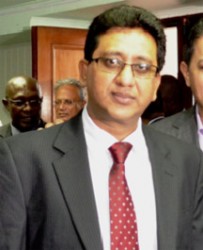PPP/C MP Anil Nandlall says Attorney-General Basil Williams has “put the cart before the horse” by seeking to rush new anti-money laundering reforms through the National Assembly without ensuring the establishment of the Financial Intelligence Unit (FIU) that is responsible for enforcement.
“It is does not make sense you put the laws in place and you don’t have the body to enforce the law. The body to enforce the law is the FIU and there is no FIU. In other words, the Anti-Money Laundering and Countering the Financing of Terrorism (AML/CFT) apparatus in Guyana is headless….,” Nandlall told Stabroek News.
He said the PPP/C will not support the amendment bill that is to be taken through all its stages when the National Assembly reconvenes on May 4 since it does not want to be part of a process that continues to undermine parliamentary norms, abrogate democratic traditions and violate the Standing Orders
“It is obvious that the AG is yet to comprehend the fundamental principles governing the AML/CFT regime. There are legislative requirements which must be satisfied; there are administrative requirements which must be met; and there are operational standards with which there must be compliance. The axis upon which the entire AML/CFT apparatus rotates is the FIU. The FIU is the regulatory body, which administers and enforces the entire AML/CFT legislative network. Without the FIU, the AML/CFT regime simply cannot function. Currently, there is no FIU functioning; this coalition government amended the law to create a newly structured FIU along with a governing board. They resided the responsibility for appointing persons to these institutions with the National Assembly. They have been recalcitrant in getting the National Assembly to appoint persons to these positions. Therefore, updating the laws without an FIU in place, is a hopelessly futile exercise,” he added.

The bill, which was finalised without the input of the opposition, was published in the Official Gazette on April 15 and represents the second time in less than a year that amendments to the law are being taken before the National Assembly by the coalition government. With government controlling a majority in the House, it is expected to be passed.
Williams had told reporters at a press conference last week that the government would pass the bill to fulfill its commitments to fully comply with outstanding recommendations of the Financial Action Task Force (FATF) and the Caribbean Financial Action Task Force (CFATF). He said the Attorney General’s Chambers held consultations on the draft bill in March and April and that he was satisfied that they were adequate to see the bill taken through its final readings and passed next week. He noted that key stakeholders, including the opposition, received copies of the draft bill and other pertinent documents to enable them to be fully informed and give comments on the draft bill. Those attending the consultations included representatives of the Customs Anti-Narcotic Unit, the Special Organised Crime Unit, the Private Sector Commission, the Bank of Guyana and the Guyana Bar Association.
Nandlall, however, said if Williams knew it was imperative that the bill be passed by a certain deadline, he should have informed of the urgency and worked towards meeting the deadline.
“The AG knew since November last year that this bill had to have been passed to meet this deadline, yet the Prime Minister adjourned the Parliament for several months.
That decision to adjourn the Parliament for such a long sojourn must have been a collective one. Why did the AG not indicate to his colleagues that he had this deadline to meet? The Parliament was adjourned for several months to accommodate ministers travelling around the world with taxpayers’ dollars. …We will not sacrifice the democratic traditions of Parliament at the altar of this government’s collective incompetence,” Nandlall declared. “Indeed the bill which the AG intends to take to the Parliament creates a slew of functional responsibilities which are to be discharged by the director of the FIU.
In those circumstances, it is crystal clear that the AG’s focus is misplaced. He is obliged to establish the FIU first, before passing new and additional bills. At the end of the day, Guyana will never be able to extricate itself from the morass of non-compliance in which we are in unless the FIU is appointed, is independent and functional.
That is a pre-requisite. And then we can seek to update all legislation,” he added. In March this year, the Parliamentary Standing Committee on Appointments invited applications for suitably qualified persons to head the FIU. The advertisement came just a day after an International Monetary Fund team called for the speeding up of action on outstanding anti-money laundering steps.
Earlier this year, the government had confirmed that there was no one occupying the post of Director of the FIU as of the end of last year. The position was previously held by Paul Geer.
Applicants for the position of Director must have at least 10 years’ experience in law, finance, economics or accounting at the highest managerial level and sound knowledge of financial investigations or banking.
Advertisements were also placed for a Deputy Director, attorney-at-law and accountant. Applications had to be delivered to parliament not later than March 30, 2016.




